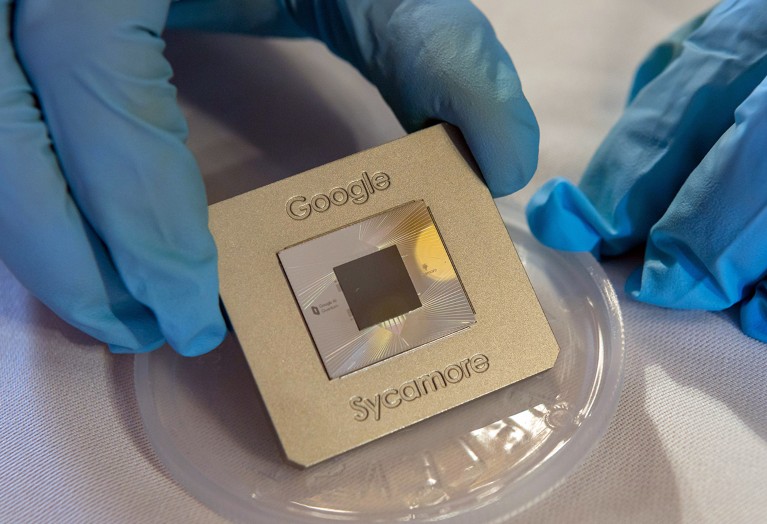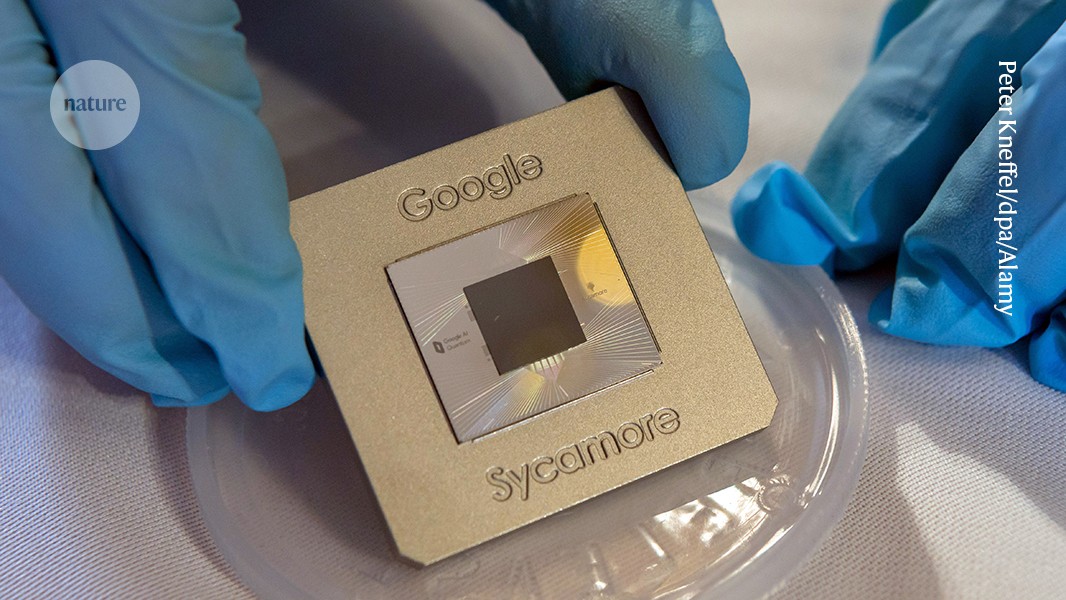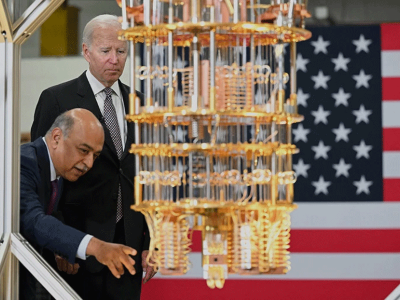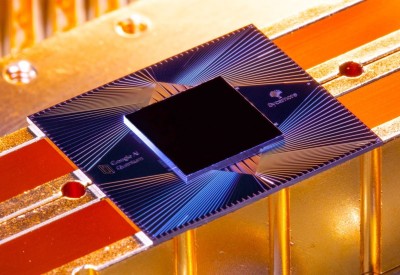
Google’s Sycamore processor uses quantum bits, or qubits, to run algorithms.Credit: Peter Kneffel/dpa/Alamy
Ever since the first quantum computers were dreamt up in the early 1980s, researchers have looked forward to the day the devices could solve problems that are too difficult for classical computers. In the past five years, the machines have finally begun to challenge their classical cousins — although definitive victory over them has remained elusive.
Now, in the latest chapter of the battle to achieve this ‘quantum advantage’, researchers at Google say they have determined the conditions under which quantum computers can beat their classical counterparts. To understand these conditions, they used a quantum-computer processor named Sycamore to run random circuit sampling (RCS), a simple quantum algorithm that essentially generates a random sequence of values.
Google’s quantum computer hits key milestone by reducing errors
The team analysed Sycamore’s output and found that when it ran in a mode with a lot of noise interference while performing RCS, it could be ‘spoofed’, or beaten, by classical supercomputers. But, when the noise was lowered to a certain threshold, Sycamore’s computation became complex enough that spoofing it was effectively impossible — by some estimates, it would take the fastest classical supercomputer in the world ten trillion years. The finding, first reported in a preprint on the arXiv server last year, was published today in Nature1.
This is a convincing demonstration that Sycamore is capable of outpacing any classical computer running RCS, quantum specialists told Nature. In 2019, Google reported that its quantum computer could run RCS and achieve a quantum advantage, but since then classical computers have been able to run the algorithm more quickly than estimated, eliminating the purported advantage. This time around, “Google did a very good job of both clarifying and addressing many of the known issues with RCS,” says Michael Foss-Feig, a quantum-computing researcher at the computer software firm Quantinuum, who is based in Broomfield, Colorado. And the new findings show how much noise quantum computers can have and still beat classical computers, he says.
The continuous competition between classical and quantum computers has been a driving force in the field, says Chao-Yang Lu, a quantum physicist at the University of Science and Technology of China in Shanghai. It has motivated researchers to build bigger and higher-quality quantum computers.
Google’s latest result does not mean that quantum computers will replace classical computers. For instance, Sycamore cannot perform typical operations of a regular computer, such as storing photos or sending e-mails. “Quantum computers are not faster — they’re different,” says Sergio Boixo, the head of Google’s quantum computing effort in Santa Barbara, California. They are intended to eventually do classically impossible — and useful — tasks, such as exactly simulating chemical reactions.
Exponential growth
The Sycamore processor looks similar to the silicon chips that power everyday laptops, but it is specially fabricated to control the electrons that flow through it — with quantum precision. To reduce temperature fluctuations that would destroy the electrons’ delicate states and introduce noise, the chip is kept at ultracold temperatures near absolute zero.
IBM quantum computer passes calculation milestone
Rather than using classical bits (which are always either a 0 or 1) as a regular computer does, the quantum chip relies on qubits, which harness the electrons’ ability to be in a mixture of states. A quantum computer can conduct some tasks with exponentially fewer qubits than the bits a classical computer would need. For example, to run the RCS algorithm, a classical computer would need 1,024 bits and a quantum computer would need 10 qubits.
Five years ago, a team of Google researchers reported in Nature2 that to match a 200-second RCS run on their 53-qubit computer, it would take a classical supercomputer 10,000 years. Almost immediately, the claim came under fire; researchers at the technology giant IBM posted a preprint online3, ahead of peer review, which suggested that a supercomputer could actually complete the task in days. In June, Lu and his colleagues used powerful classical computers to spoof the result in just over one minute4.
Google’s 2019 result is not the only one that has fallen to classical spoofing. In June 2023, IBM researchers and others reported evidence5 that their 127-qubit computer could solve potentially useful maths problems that were “beyond brute-force classical computation”. Within weeks, multiple studies6,7 showed that classical approaches could still compete.
High fidelity
Boixo and his colleagues wanted to understand how noise made quantum computers vulnerable to classical spoofing. They found that even tiny differences in qubit noise — going from a 99.4% error-free rate to 99.7% — caused Sycamore to behave as if it were in a new state, similar to matter transitioning from solid to liquid.
Hello quantum world! Google publishes landmark quantum supremacy claim
“What [the noise] is doing, it’s turning the system into something more classical,” Boixo says. Once an upgraded version of Sycamore running with 67 qubits was past a certain noise threshold, its RCS output became impossible to simulate classically.
Within the past two years, attempts to beat classical supercomputers have also focused on reducing qubit noise. Foss-Feig and his colleagues ran RCS on a quantum computer with 56 low-error qubits8. With better qubits, “at least for RCS, classical computers can no longer keep up with quantum computers”, he says.
Someday, researchers hope quantum computers will be large enough and free enough from errors to move past the quantum–classical war. For now, they’ll settle for the battle. If you cannot win an advantage with RCS, the simplest of applications, Boixo says, “I don’t think you can win in any other application”.





